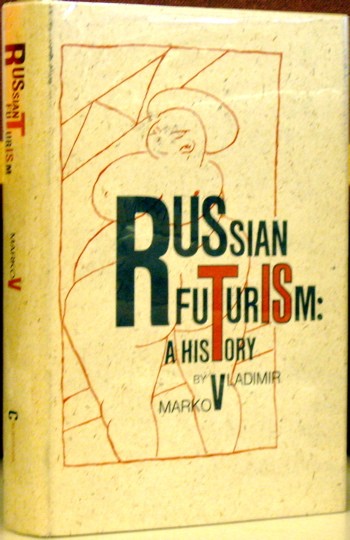Vladimir Markov: Russian Futurism: A History (1968)
Filed under book | Tags: · 1910s, art, art history, avant-garde, cubo-futurism, ego-futurism, futurism, impressionism, poetry, russia, zaum

“Vladimir Markov’s Russian Futurism: A History is the classic in its field. Its learned account of Russian avant-garde poetics with respect to various forms and genres-poems, plays, artist’s books, manifestos-is still the first I turn to when I want to review the critical information about Futurist manifestos or Khlebnikov’s long poems and stories, or the collaborations of Goncharova and Kruchenykh.” – Marjorie Perloff
Publisher University of California Press, 1968
ISBN 9780520008113
467 pages
via greatjob
Reviews: Helen Muchnic (Russian Review, 1969), Xenia Gasiorowska (Slavic and East European Journal, 1970), Maurice Friedberg (Problems of Communism, 1970), Edward Wasiolek (Modern Philology, 1972).
Comment (0)Luciano Chessa: Luigi Russolo, Futurist: Noise, Visual Arts, and the Occult (2012)
Filed under book | Tags: · art, art history, biography, futurism, noise, occultism, synaesthesia

“Luigi Russolo (1885–1947)—painter, composer, builder of musical instruments, and first-hour member of the Italian Futurist movement—was a crucial figure in the evolution of twentieth-century aesthetics. As creator of the first systematic poetics of noise and inventor of what has been considered the first mechanical sound synthesizer, Russolo looms large in the development of twentieth-century music. In the first English language study of Russolo, Luciano Chessa emphasizes the futurist’s interest in the occult, showing it to be a leitmotif for his life and a foundation for his art of noises. Chessa shows that Russolo’s aesthetics of noise, and the machines he called the intonarumori, were intended to boost practitioners into higher states of spiritual consciousness. His analysis reveals a multifaceted man in whom the drive to keep up with the latest scientific trends coexisted with an embrace of the irrational, and a critique of materialism and positivism.”
Publisher University of California Press, 2012
An Ahmanson Foundation Book in the Humanities
ISBN 0520270630, 9780520270633
284 pages
PDF
EPUB
See also Luigi Russolo’s The Art of Noises (1987)
Alexei Kruchenykh, et al.: Victory Over the Sun (1912–) [RU, EN, DE]
Filed under booklet | Tags: · avant-garde, futurism, music, opera, russia, theatre

“Victory over the Sun (Победа над Cолнцем; Pobeda nad Solntsem) is a Russian Futurist opera premiered in 1913 at the Luna Park in Saint Petersburg.
The libretto written in zaum language was contributed by Alexei Kruchenykh, the music was written by Mikhail Matyushin, the prologue was added by Velimir Khlebnikov, and the stage designer was Kazimir Malevich. The performance was organized by the artistic group Soyuz Molodyozhi. The opera has become famous as the event where Malevich made his first Black Square painting (in 1915).
The opera was intended to underline parallels between literary text, musical score, and the art of painting, and featured a cast of such extravagant characters as Nero and Caligula in the Same Person, Traveller through All the Ages, Telephone Talker, The New Ones, etc.
The audience reacted negatively and even violently to the performance, as have some subsequent critics and historians.” (Wikipedia)
Published in Moscow, Dec 1912
28 pages
English translation
Translated by Ewa Bartos and Victoria Nes Kirby
Published in The Drama Review 15:4, Fall 1971, pp 106-124
Kruchenykh at Monoskop wiki
Wikipedia
Pobeda nad solntsem (Russian, JPGs)
Victory Over the Sun (English, 1971)
Sieg über die Sonne (German, trans. & comm. Gisela Erbslöh, 1976, JPGs/PDF, added on 2015-8-10)
Audio recording (Monoskop wiki)
Comment (0)
